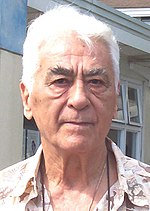About John Havan
- John Havan was born in Paris, France in 1933.
- His Vietnamese father, a Sorbonne graduate in law, became Finance Minister under the administration of South Vietnamese President Ngo Dinh Diem.
- His British mother, enrolled at the London School of Art, eventually became a painter who used Chinese calligraphy as a base for her brush-and-ink drawings of Vietnamese scenes.
- At home, the family spoke French. Havan was educated in England, won a scholarship to St.
- Peter's Hall, Oxford, where he read Jurisprudence for two years.
- From 1955 to 1972, he worked with American and European firms in the Asia-Pacific region in the fields of defense contracting, in particular spending the Vietnam War years, working for U.S.
- firms in South Vietnam.
- In 1956 he volunteered for two years' service in the Army of the Republic of Vietnam (ARVN) infantry, where he reached the rank of captain.
- During that period, he became fluent in his father's native language, Vietnamese.
- The ability to speak, read and write English, French and Vietnamese at a time when the French military was pulling out of Vietnam, the American military was becoming directly involved in that Southeast Asian conflict, and the French-trained Army of the Republic of Vietnam (ARVN) had to be re-trained in the American doctrines of war led to Havan being placed in situations where he had contact with some of the principal actors involved and was able to appreciate their distinctively different mindsets. After the fall of Saigon in 1975, Havan worked in defense sales as the Southeast Asia consultant for the Office General de l'Air (OGA), a branch of the French Defense Ministry that focused on the promotion of French military equipment.
- In 1988, he became a Regional Manager, SEA, for Plessey PLC (UK) – radars – and later G.E.
- (US) – aircraft engines.
- In 2000 he retired from defense sales and settled down to writing.
Read more at Wikipedia


 Date of Birth:
Date of Birth:  Place of Birth: Paris, Île-de-France, France
Place of Birth: Paris, Île-de-France, France